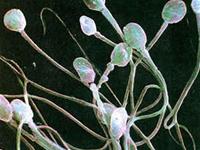Sperm is produced by the testes. Spermatogenesis is a complex process that not only occurs in the testes but also relies on the functioning of other endocrine glands, particularly the pituitary gland. Therefore, any factors that affect this system can influence sexual function and sperm quality.
Causes related to the hypothalamus – pituitary gland: The activity of this region may be impaired, resulting in insufficient secretion of Follicle Stimulating Hormone (FSH) to stimulate the testes for sperm production. Sometimes, this area may secrete excessive levels of other hormones like prolactin, which can reduce libido and sperm production.
 |
|
(Photo: TTO) |
Causes related to the testes may include:
– Cryptorchidism (or undescended testes): When in the fetal stage, the testes are formed in the pelvic area and gradually descend into the scrotum through the inguinal canal around the seventh month of gestation. If a child is born with the testes still located in the abdominal cavity and unable to descend into the scrotum, those testes cannot produce sperm, even though they may still secrete testosterone.
This condition has been known since ancient times, but the exact cause was unclear. Later, it was discovered that the internal body temperature (37 degrees Celsius) caused the testes to lose their ability to produce sperm.
Therefore, if it is discovered that a child has undescended testes, it is essential to have them examined early so that treatment or surgery can be performed to bring the testes down into the scrotum before the child reaches one year of age.
– Severe varicocele: The vascular bundle supplying the testes includes arteries and accompanying veins, located alongside the spermatic ducts at the base of the penis within the scrotum. When these veins become dilated, a tangled mass of vessels can be felt just beneath the skin of the scrotum.
Varicocele negatively affects spermatogenesis by increasing the temperature of the scrotum, causing a buildup of metabolic waste products or reducing blood flow to the testes due to increased venous pressure.
– Hydrocele can also adversely affect sperm production.
– Infectious diseases or viruses such as mumps, smallpox, chickenpox, and syphilis can cause testicular atrophy or necrosis.
– The testes can also be damaged by radiation, certain chemotherapy drugs, and even some common medications that can adversely affect sperm production.
Examples of antibiotics that can affect sperm production and cause sperm deformities include erythromycin, nitrofurantoin, gentamicin, chlorotetracycline, and co-trimoxazole. Other antibiotics such as spiramycin and quinolone can halt sperm production.
Notably, a stomach ulcer medication called cimetidine, along with general antihypertensive medications, can have side effects that reduce sexual function and sperm production.
Additionally, prolonged use of recreational drugs (cocaine, heroin, methadone), tobacco, and alcohol also negatively impacts sperm production.
Finally, prolonged malnutrition and a diet lacking certain nutrients such as arginine, fructose, and vitamins A, B, C, D, and E can also adversely affect spermatogenesis.


















































